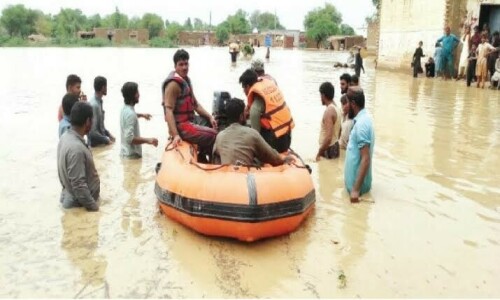Working online was a frustrating experience for the past three weeks, thanks to the installation of an upgraded “web management system” by the current hybrid regime.
Pakistan’s economy suffers in many more ways than the economy of a truly democratic and disciplined country. The country lost up to $300 million owing to internet disruptions, according to the Pakistan Software Houses Association.
The lost opportunities during these past three weeks included freelancing, IT exports, business suspension, and delays. One hopes that this massive internet outage doesn’t become a norm like power outages.
Apart from occasional similar cyclical economic losses, Pakistan also loses billions of dollars in lost opportunities due to the state’s structural and modular shortcomings. One of them is caused by the low level of innovation and the neglect of leveraging natural resources for economic progress and development.
The monsoon season is in full swing, and we continue to read about the disaster being caused by record-breaking rains in parts of the country amidst growing fears of urban flooding.
Had Pakistan developed a meticulous and easy-to-implement flood management and rain harvesting strategy soon after the 2010 floods, the losses incurred during the 2022 floods could have been minimised. But that did not happen.
Monsoon currents can be used to produce power and development instead of just destruction
Strategies are made here only to be implemented half-heartedly to please the rulers of the day and to get funds released for “projects” that remain mostly on paper while nobody knows where these funds go and why.
During the current fiscal year, the agriculture and services sectors are expected to propel the economy more than the manufacturing industry (these industries may take a little longer to get out of the crisis caused by unprecedented energy price hikes).
However, with the danger of floods looming across all agricultural zones of Pakistan, one doesn’t know how the agricultural sector’s growth will be ensured. Lahore has already experienced urban flooding, and Karachi and other cities will be facing the same danger as the monsoon intensifies. Looking forward, we do not know what will be done to mitigate the possible economic losses of the services sector.
Two things continue to cause concern. First, the provincial disaster management authorities are yet to be effectively devolved to district levels to better respond to floods and urban flooding. And second, the rain harvesting culture has yet to be popularised and made truly result-oriented.
Punjab and Khyber Pakhtunkhwa’s provincial governments have taken some initiatives for rain harvesting, but in Sindh and Balochistan, rain harvesting remains community-based and NGO-initiated. Though involving communities and NGOs in rain harvesting is always desirable, leaving this entirely in their hands is inefficient.
While Punjab and Khyber Pakhtunkhwa have taken some initiatives, rain harvesting in Sindh and Balochistan remains community-based and NGO-initiated which, though desirable, can be inefficient
The Pakistan Council of Research in Water Resources has done significant research on rain harvesting. The provincial governments of Sindh and Balochistan can use that mass of research literature to initiate rain harvesting projects at the provincial government level and large-scale projects under public-private partnerships.
Foreign collaboration from such countries as Australia, Brazil and China that rank high on modern rain harvesting technologies can also be sought.
It’s not that the policymakers in Pakistan don’t realise the severity of a problem and don’t respond to it with policies. As said earlier, these policies are not easy to implement in the first place, and in cases where they are, they are not implemented in letter and spirit.
As for water sector woes, the realisation of the problem is present. The authors of the Economic Survey of the last fiscal year do admit that “Pakistan faces a shift from water-stressed to water-scarce status” before listing the factors responsible for it, including inadequate storage.
The Survey also informs the nation that under a National Water Policy, an Integrated Water Resource Management approach is being adopted to tackle the challenges of water scarcity.
If these are not just high-sounding words but carry with them the national spirit of tackling water scarcity, then what have the federal and provincial governments done so far to turn the massive energy floods carry into power? What have they done so far to motivate and support the communities set up to run rain harvesting projects?
As for the floods, the lesser said the better. The 2022 floods caused $30 billion of economic losses in the country. Haphazard construction continues blocking the natural path water spilling from rivers may take, and vulnerability risk surveys have either not been conducted or their results have not been shared with the public to create greater awareness.
Nor have many projects been initiated that are specifically designed to reduce flood risks from major rivers.
If some projects have been started, their status remains unknown. Who amidst such a situation can expect our federal and provincial governments to even think of producing power from flood currents or tidal energy? That would be asking for too much from the people already little interested in innovation and ambitious planning.
Urban flooding in Lahore wreaked havoc on the city, causing large-scale suffering for the people. If similar floods happen in Karachi during the monsoon, the result will be far more devastating, thanks to the snail-paced, half-hearted anti-encroachment drive and the terrible quality of even the most recently built roads.
During the monsoon season, hundreds of kilometres of roads and streets collapse every year, exposing the deeply entrenched financial and moral corruption in the government contractors’ system. Let us hope that this year, the power of floods and rain is harnessed for the common good of the public.
Published in Dawn, The Business and Finance Weekly, August 19th, 2024













































Dear visitor, the comments section is undergoing an overhaul and will return soon.